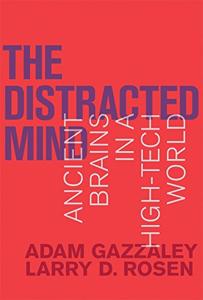
Want to learn the ideas in The Distracted Mind better than ever? Read the world’s #1 book summary of The Distracted Mind by Adam Gazzaley, Larry D. Rosen here.
Read a brief 1-Page Summary or watch video summaries curated by our expert team. Note: this book guide is not affiliated with or endorsed by the publisher or author, and we always encourage you to purchase and read the full book.
Video Summaries of The Distracted Mind
We’ve scoured the Internet for the very best videos on The Distracted Mind, from high-quality videos summaries to interviews or commentary by Adam Gazzaley, Larry D. Rosen.
1-Page Summary of The Distracted Mind
Overview
It’s not just physical and cognitive exercises that help you mitigate the brain’s limitations. Meditation has been proven to improve cognitive control, so it should be considered as a part of your routine. The first step might be finding a class in your area or learning more about meditation online.
When you need to find a solution or information, what do you usually turn to? Most likely, it’s your smartphone. With the world of information at your fingertips in such an easy way, there is hardly any information that can’t be found within seconds. Do you even remember how hard it was to keep up with friends before Facebook?
Technology is a great thing to have, but it can also be distracting. Our brains are hardwired to get distracted in certain situations, and technology isn’t helping us much.
The brain is the most complex organ in our body, and it’s packed with neurons that communicate with each other. The author points out some strategies to deal with smartphones so you don’t get addicted to them. It’s not about going back to a primitive lifestyle; it’s about getting more from life.
The book will help you learn about the brain’s response to scary situations (e.g., a lion) and how often people check their smartphones every day. You’ll also be able to figure out what changes you can make to your brain for the better.
Big Idea #1: The brain’s limitations cause us to be easily distracted.
The human brain is one of the most amazing things in the universe. It allows us to do great things, such as solving math problems and learning languages.
The brain is one of the most complex systems in the universe. It helps us perform a number of tasks, such as planning, decision-making and evaluation. These are known as executive functions.
The brain must plan before it can actually do something. It does this by using attention, goal management and working memory.
Without cognitive control, we couldn’t think consciously and make decisions that impact our lives. We’d just respond to the world around us without thinking about it.
Imagine you’re going to a supermarket because you need food and drinks for some friends who are coming over. If you suddenly lose all attention, your ability to remember the goal of getting beer and snacks would vanish as well. You’d wander around without any aim or purpose whatsoever.
Cognitive control is essential for success. However, we are more distracted today than ever before. This is because the brain is complex and vulnerable to interference from outside factors.
If we had evolved to be able to control our minds, that would have been great. However, it seems like the opposite has happened. Our cognitive control is less developed than our executive functions because we forget things easily and don’t remember important tasks. This explains why people tend to forget their friends’ birthdays or fail to turn off lights when they leave a room.
Big Idea #2: We are naturally distracted by certain things.
It’s easy to think that we’re in control of our actions, but this isn’t always true. We can’t help but respond automatically to environmental stimuli that are immediately noticeable (saliency) and surprising (novelty).
We can’t control our involuntary responses. They’re a part of the survival instinct that has been passed down from our ancestors.
We are more than just creatures that respond to stimuli. We can also pause and decide what the best course of action is. This is called top-down influence, which we have evolved over time.
Let’s take a look at an example. Imagine that a baby is pinching your arm and you pull away in pain. You won’t hit the baby back because you know he or she isn’t going to hurt you. There’s no need for any action because of the “pause” where we evaluate possible responses before taking action.





